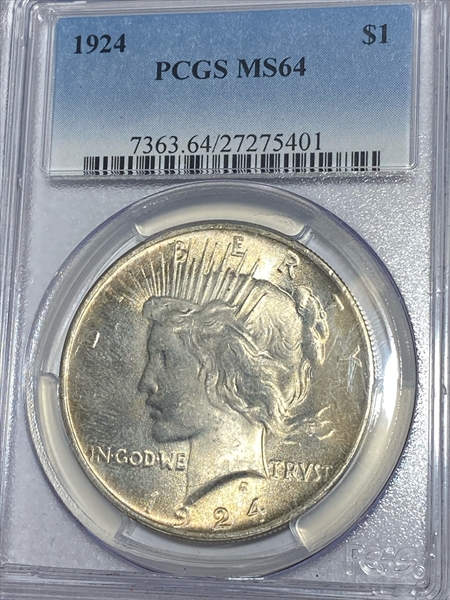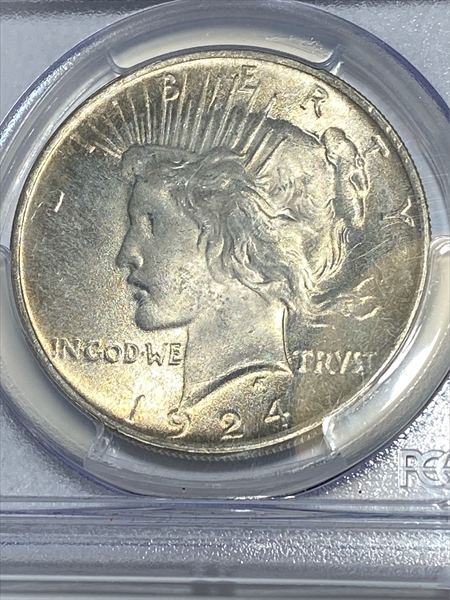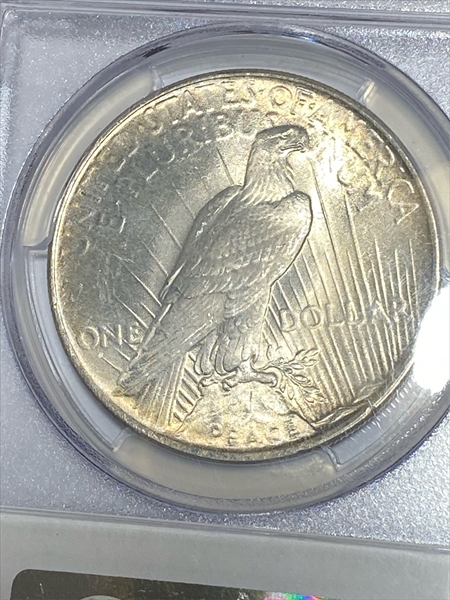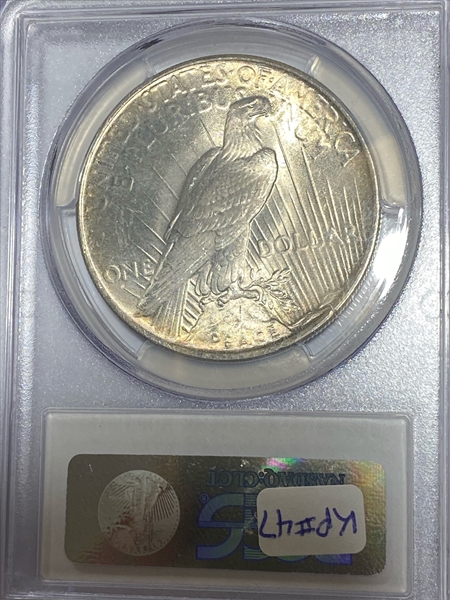1924 $1 MS64 认证号27275401, PCGS号7363
拥有者评论
专家评论
Ron Guth
The 1924 Peace Dollar is a common date, nearly on par with the 1925 in terms of overall mintage, but not nearly as common as the 1922 and 1923. Collectors will have no difficulty finding a high-grade example of this date. Most of the certified Mint State examples fall into the MS-64 category, followed closely by the MS-63 category. Even Gems are relatively common, especially in MS-65, and the big drop-off in the population comes at the MS-67 level. Luster on the 1924 Peace Dollar ranges from soft, frosty (almost granular surfaces) to a bright, flashy luster. Generally, the strike is good, with none of the weakness associated with coins from the Denver and San Francisco mints (especially the latter). The overall eye appeal and above-average quality of the 1924 Peace Dollar make it an excellent choice for type collectors.
According to the June 1934 issue of The Numismatist (p. 416), collectors could still purchase Uncirculated 1924 Peace Dollars for "the face value of the coins and an amount sufficient to cover the mail charrges by first-class mail."
Q. David Bowers
The following narrative, with minor editing, is from my "Silver Dollars & Trade Dollars of the United States: A Complete Encyclopedia" (Wolfeboro, NH: Bowers and Merena Galleries, Inc., 1993).Coinage Context
Large mintage: The large mintage of nearly 12 million coins was not needed in commerce. Many bags went into storage where they remained for decades.
Numismatic Information
Hoard coins: Many 1,000 coin mint-sealed bags of this date came out in 1949 and 1950, in addition to bags released before and after that time. In 1953-54 there were large quantities of bags in Eastern banks, but there was little dealer interest in buying them, even for face value. These stocks remained in bank vaults through the rest of the decade. However, in comparison to certain other Peace dollars, apparently bags of 1924 were elusive by the time that the 1960s rolled around (see next paragraph).
Circulated grades: The 1924 is common in circulated grades, up to and including AU. Millions exist.
Mint State grades: Many 1924 Peace dollars are above average in striking quality and have attractive, satiny lustre.
However, there are numerous exceptions, and dull, grainy-surface coins exist as well. So many coins were struck from so many die pairs, that no one rule covers all specimens. Cherrypicking is advised, but in this instance it will not be difficult to find a really nice specimen in a grade such as MS-63, 64, or 65, as you prefer. The issue is among the most common Peace dollars in high grades and one of the least expensive. However, it is several orders rarer than 1923, to which it is sometimes compared.
Circulated grades: The 1924 is common in circulated grades, up to and including AU. Millions exist.
Mint State grades: Many 1924 Peace dollars are above average in striking quality and have attractive, satiny lustre.
However, there are numerous exceptions, and dull, grainy-surface coins exist as well. So many coins were struck from so many die pairs, that no one rule covers all specimens. Cherrypicking is advised, but in this instance it will not be difficult to find a really nice specimen in a grade such as MS-63, 64, or 65, as you prefer. The issue is among the most common Peace dollars in high grades and one of the least expensive. However, it is several orders rarer than 1923, to which it is sometimes compared.
Among the "big four" common date Philadelphia Mint coins in the Peace dollar series-the 1922, 1923, 1924, and 1925-the 1924 is the most elusive in all Mint State categories.
Some Mint State coins have pebbly-bright surfaces due to wire brushing the dies and/or excessive die wear. Some high-grade coins have white "dried milk" spotting, thought to be from dilute sulfuric acid used at the Mint.
Some 1924 Peace dollars in Mint State are known from dies with "pitted" or pebbly matte surfaces. Perhaps the dies were pickled in acid in order to remove finishing marks, or were lightly rusted. The resultant coins have an irregular matte surface showing many tiny projections under high magnification.
Varieties
Circulation strikes:
1. Breen-5720. Hub combination II-B2. VAM-1, the major variety.
VAM-IA has a die cut from the left of the 1 in the date extending vertically to the space between 0 and D of GOD. VAM-2 has slight doubling on reverse.
Dies prepared: Obverse: Unknown; Reverse: Unknown.
Circulation strike mintage: 11,811,000
Estimated quantity melted: Unknown.
Characteristics of striking: Usually with above average striking sharpness.
Known hoards of Mint State coins: Many bags were released in the 1940s and 1950s, but by the 1960s bags were relatively scarce.
Commentary
This and the 1922, 1923, and 1925 Philadelphia Mint issues constitute the four most common Peace silver dollars, although in Mint State the 1924 is somewhat scarcer than the other three.
Pittman Act Report
The Annual Report of the Director of the Mint for the fiscal year ending June 3D, 1924, told of silver purchases:
"All of the silver purchased under the terms of the so called Pittman Act, remaining undelivered June 30, 1923, has been received during the past fiscal year except 588,642 ounces. Deliveries to the mints upon all accepted tenders must be made on or before October 1, 1924. Approximately 36 million silver dollars remain to be coined from the silver purchased under this act.
"The New York market price of silver during the fiscal year ended June 3D, 1924, averaged $0.64517; the lowest price was $0.62875 on August 23-24, 1923; and the highest price $0.675 on various dates in June 1924."
Efforts to Make Dollars Circulate
The Numismatist, September 1924, advised readers as follows: "To Force Peace Dollars Into Circulation: Stored in the vaults of the Treasury Department at Washington are hundreds of thousands of silver dollars that are not working. In reporting that the Treasury has embarked on a campaign to restore this coin to circulation. The initial step was taken when one of the coins was placed in the pay envelope of each of the 5,000 Treasury employees, and similar action would be suggested to other government bureaus. The retirement of silver certificates will follow as a matter of course. Few silver dollars have been in circulation in this part of the country' during the last 10 or 15 years."
稀有性和存量估计 了解更多
| 所有评级 | 3600000 |
| 60或以上 | 600000 |
| 65或以上 | 20000 |
| 所有评级 | R-1.0 |
| 60或以上 | R-1.5 |
| 65或以上 | R-2.8 |
| 所有评级 | 17 / 23 TIE |
| 60或以上 | 20 / 23 |
| 65或以上 | 20 / 23 |
| 所有评级 | 18 / 24 TIE |
| 60或以上 | 21 / 24 |
| 65或以上 | 21 / 24 |



























